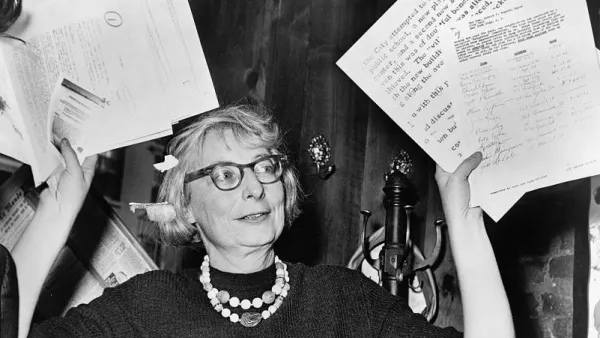The machine-city envisioned by Le Corbusier, and made into practice in decades of modernist bureaucracy, has ultimately produced, according to Simon Richards' essay, an antisocial environment, against which urban planning seems to be now reacting.
"Why is socializing in cities taken to be a good thing? Why do we assume it is beneficial for people to experience urban variety, opportunity, and intrigue? These are not questions normally asked, and it feels perverse to frame them as questions. Still, we have not always been so sure about socializing in cities. We have forgotten the negative argument - that the unregulated social life of large cities is a corrupting influence best avoided. It had never occurred to me to raise these questions until I began research on Le Corbusier. At the same time that he is celebrated as the visionary architect of such modernist masterpieces as the Villa Savoye (1928) and the pilgrimage chapel at Ronchamp (1955), he is decried as an irresponsible and perhaps mentally disturbed city planner. In his Plan Voisin from 1925, for example, Le Corbusier proposed to demolish the center of Paris and replace it with towers in parkland. The prospect of German cities bombed flat by the Allies during World War II made him envious - the Germans were able to rebuild from ground zero. (Incidentally, many British planners offered thanks to the Luftwaffe for returning the favor.) He made plans that would mean (as he put it himself) the "Death of the Street." In proposing the elimination of side alleys and shops, in granting limited space for cafés, community centers, and theaters, in dispersing them over great distances, and constructing them of uninviting concrete, glass, and steel, Le Corbusier expressed his contempt for the teeming hubbub that urbanists now esteem "
Thanks to Alessandro Busa'
FULL STORY: The Antisocial Urbanism of Le Corbusier

Planetizen Federal Action Tracker
A weekly monitor of how Trump’s orders and actions are impacting planners and planning in America.

Chicago’s Ghost Rails
Just beneath the surface of the modern city lie the remnants of its expansive early 20th-century streetcar system.

Amtrak Cutting Jobs, Funding to High-Speed Rail
The agency plans to cut 10 percent of its workforce and has confirmed it will not fund new high-speed rail projects.

Ohio Forces Data Centers to Prepay for Power
Utilities are calling on states to hold data center operators responsible for new energy demands to prevent leaving consumers on the hook for their bills.

MARTA CEO Steps Down Amid Citizenship Concerns
MARTA’s board announced Thursday that its chief, who is from Canada, is resigning due to questions about his immigration status.

Silicon Valley ‘Bike Superhighway’ Awarded $14M State Grant
A Caltrans grant brings the 10-mile Central Bikeway project connecting Santa Clara and East San Jose closer to fruition.
Urban Design for Planners 1: Software Tools
This six-course series explores essential urban design concepts using open source software and equips planners with the tools they need to participate fully in the urban design process.
Planning for Universal Design
Learn the tools for implementing Universal Design in planning regulations.
Caltrans
City of Fort Worth
Mpact (founded as Rail~Volution)
City of Camden Redevelopment Agency
City of Astoria
City of Portland
City of Laramie





























